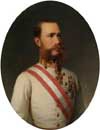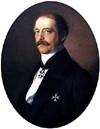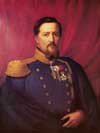In 1864, a conflict set Prussia and Austria against Denmark. This conflict concerned three territories, Schleswig, Holstein and Lauenburg, and their significant German-speaking populations, which the kingdom of Denmark attempted to “degermanise” and to integrate more closely with the rest of the kingdom. This conflict was not new: its roots lay in the 1814 treaty of Kiel, an agreement which ‘punished' Denmark for having supported France during the war and which gave significant advantages to Sweden and also Britain. Denmark therefore decided to reassert its power in the three duchies which, although Schleswig and Holstein may have shared the same sovereign since the 18th century, were otherwise not politically united with the country.
On the origins of a European conflict
Over the course of the first half of the 19th century, the “Germanic Party” became a rallying point for ever-growing numbers of German-speakers from the three territories under Danish rule. These German-speakers, for the most part of high social rank, wished to create an independent state comprised of the three duchies set at the heart of the German Confederation, the German federative body which had succeeded the Confederation of the Rhine created by Napoleon.
However, the King of Denmark, Christian VII, rejected this attempt at independence and in 1840 went so far as to impose Danish as the administrative language in the duchies despite the fact that German was the language of the majority and in constant growth. The situation was also complicated by a dynastic crisis since the heir of the Danish king, the future Frederick VII, had no direct descendents, and the Salic law of the duchies was contrary to Denmark's laws of succession, which allowed male succession via a female line; thus the successor to the Danish throne could not be recognised in the duchies, itself constituting another element in the conflict.
A first revolt broke out in the duchies in 1848. Frederick VII had been crowned king that January, and in March decided to create a constitution common both to Denmark and the duchies. Certain “patriots” then created a separatist provisional government in Holstein, which was unanimously supported by the German Confederation and Austria, in both of which subscriptions to finance the arming of the rebels were rapidly being organised. Indeed, the German Confederation saw in these events an opportunity to reassert itself in the north, and so it transferred the direction of military protection of the duchies to Prussia, which sent General Wrangel and his men first into the duchy of Holstein and then into Schleswig. Whilst Prussian troops carried out this mission across land, Denmark in retaliation mounted a naval blockade on the Prussian ports in the Baltic, an action which rapidly had a negative impact on the economy and the great landed nobility of Prussia. This escalation changed the affair from a nationalist Dano-Prussian war to a European conflict.
Failure of international mediation: the treaty of London, 1852
 London and St Petersburg were the first to react to the conflict. Both saw this as Prussia growing in power and gradually taking control of the straits leading to the Baltic, a situation incompatible with the foreign policy of both nations. France soon joined with these two countries in demanding a ceasefire. Frederick William IV of Prussia acceded to this readily, since he had only unwillingly committed himself to support the rebels in the duchies. The armistice of Malmö of the 26th August, 1848 was finally ratified at Frankfurt by the parliament of the German Confederation on the 16th September in that same year.
London and St Petersburg were the first to react to the conflict. Both saw this as Prussia growing in power and gradually taking control of the straits leading to the Baltic, a situation incompatible with the foreign policy of both nations. France soon joined with these two countries in demanding a ceasefire. Frederick William IV of Prussia acceded to this readily, since he had only unwillingly committed himself to support the rebels in the duchies. The armistice of Malmö of the 26th August, 1848 was finally ratified at Frankfurt by the parliament of the German Confederation on the 16th September in that same year.
Four years later, the five powers involved, Great Britain, Russia, France, Austria and Prussia, gathered once more in London to pronounce on the fate of the duchies. On the 8th May 1852 the London protocol was signed. Essentially this document ruled on the legal outcome of the Danish succession crisis. The powers had come to a compromise, agreeing to accept a third candidate, a cousin of King Frederick VII via a female line of succession. No assembly of states of the two duchies of Holstein and Schleswig, nor the parliament of the German Confederation, to which Lauenburg was subject, however, had been consulted. This lack of consultation rankled and made the reappearance of the conflict in the future all the more likely.
The death of Frederick VII on the 17th November 1863 reignited separatist sentiment in the German-speaking territories of the country; indeed they had already been forced to submit to the monarch's policy of “degermanisation”. In fact on the 19th March 1863, Holstein had once again demanded the protection of the German Confederation in an attempt to head off Frederick VII's renewed efforts to bring the territory under complete Danish jurisdiction. The King's death, shortly after the announcement of a new shared constitution for the duchies and Denmark, triggered the succession crisis which all had feared ten years before: Christian IX saw himself contested as the rightful ruler of the duchies by Frederick of Augustenburg, whose father had in fact renounced his right over the territories in London.
The risk of serious rebellion in the region came to a head when the diet of Frankfurt officially supported those fighting for independence. Using the London protocol as a pretext for his views on the duchies, Bismarck proposed that Austria serve as mediator in the conflict, and that the Prince of Augustenburg should be removed. Palmerston, who had been Minister of Foreign Affairs during the first conflict and now Prime Minister, surveyed the situation with interest: Prussia's position was no more reassuring for Great Britain than it had been ten years earlier.
Napoleon III’s support of Prussia
 Indeed, Palmerston proposed a Franco-British armed mediation to Napoleon III, so as not to let Prussia and Austria alone intervene in the conflict, and thereby run the risk that these two countries would take advantage of the situation and assume control of the duchies; indeed this was an outcome which had well been anticipated in a secret Franco-British agreement signed by the two countries on the 16th January 1864. Bismarck was worried about what the French emperor's response would be, because he knew that victory in the duchies could not be obtained if the fight spread to any other European fronts. The chancellor's support for the Russians against the Polish insurrection of 1862-3 had led to a cooling of relations between Prussia and France. At any rate, Napoleon III's refusal to intervene greatly satisfied Bismarck.
Indeed, Palmerston proposed a Franco-British armed mediation to Napoleon III, so as not to let Prussia and Austria alone intervene in the conflict, and thereby run the risk that these two countries would take advantage of the situation and assume control of the duchies; indeed this was an outcome which had well been anticipated in a secret Franco-British agreement signed by the two countries on the 16th January 1864. Bismarck was worried about what the French emperor's response would be, because he knew that victory in the duchies could not be obtained if the fight spread to any other European fronts. The chancellor's support for the Russians against the Polish insurrection of 1862-3 had led to a cooling of relations between Prussia and France. At any rate, Napoleon III's refusal to intervene greatly satisfied Bismarck.
Napoleon III had found the Russian repression of Poland distasteful, and his opposition to Russia on this subject was intensified by Russia's status as one of the Protecting Powers over the duchies under the same title as Great Britain. There is no doubt that the French Emperor made the diplomatic choice to allow Prussia to expand at the expense of Denmark in order to soothe Franco-Prussian relations. Though underestimating the power of Prussia, it is evident that Napoleon III saw in this Prussian expansion a way of counterbalancing Great Britain's position in the Baltic and also comforting Austrian power in central Europe.
It is equally likely that the sovereign, since he had favoured Italian aspirations for national emancipation, may have felt similarly about the matter of the German-speaking populations of the duchies. Napoleon III's proposition to organise a plebiscite in the duchies appears to corroborate this theory. However, his idea was unanimously rejected by the other signatory powers of the London protocol.
Bismarck, and his master William I, whom the chancellor finally won over, were resigned however to the fact that their plans to annex the duchies were unlikely to be accepted by the inhabitants of these territories, (or indeed by the majority of the peoples in the German Confederation) since those inhabitants' main desire was for the creation of a new and independent state.
Towards Prussian hegemony
Prussia in the end accepted Denmark's demand that the duchies be brought under control of its own crown and declared the London protocol null and void. However, perhaps paradoxically, Bismarck recognised Danish ownership of these territories so as better to justify that they had become Prussian, as a result of the Prussian invasion. Divided on the matter, Europe allowed Prussia to assert its power over this territory via the treaty of Vienna of the 30th October 1864, which anticipated joint Austro-Prussian rule over the duchies. Soon after, Bismarck would in the end definitively separate Austria from these territories and from the German Confederation. And Napoleon III would certainly have plenty of time in subsequent years to regret his support for Prussian projects for expansion, and primacy, to the detriment of Austria…


